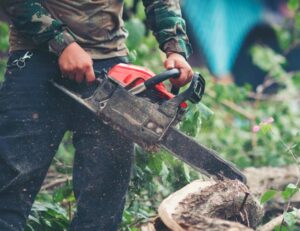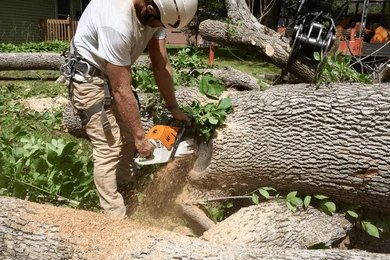The Importance of Chainsaw Certification for Workers in Alberta
Chainsaw operation is a crucial skill for many workers in Alberta, whether in forestry, landscaping, or construction. However, improper use can lead to dangerous accidents, injuries, or costly damage. Chainsaw certification ensures that workers have the necessary knowledge and practical skills to operate these tools safely and efficiently. In this article, we’ll explore why chainsaw certification is essential for workers in Alberta and how it can protect both individuals and businesses.
Learn More About Chainsaw Certification at Southbrook Safety
Why Chainsaw Certification is Essential for Workers in Alberta
1. Promotes Safety on the Job Site
Operating a chainsaw comes with inherent risks, including potential accidents involving sharp blades or flying debris. Workers who are properly trained in chainsaw operation are better equipped to avoid injuries and safely handle hazardous situations.
- Understanding how to properly maintain and operate the chainsaw.
- Learning about protective gear and its importance.
- Safe handling techniques to prevent accidents.
2. Compliance with Alberta’s Occupational Health and Safety Standards
In Alberta, businesses are required to meet certain safety standards to ensure a secure working environment. Chainsaw certification can help businesses comply with these regulations by ensuring their workers have received the necessary training.
- Certification helps demonstrate compliance with legal safety standards.
- Reduces the likelihood of workplace accidents and legal penalties.
What’s Included in Chainsaw Certification Training?
1. Basic Chainsaw Operations
Workers will learn about the essential functions and features of chainsaws. This includes understanding how to handle and operate different types of saws based on the job requirements.
2. Safety Measures and Risk Assessment
Proper training covers safety protocols, protective gear, and emergency response techniques to ensure workers know how to protect themselves and their colleagues. Risk assessments are essential to understand the potential dangers before beginning work.
- Risk assessments ensure safe working conditions.
- Regular maintenance of chainsaws is covered to ensure long-term safety.
3. Proper Maintenance and Troubleshooting
Part of the certification process includes learning about chainsaw maintenance to keep tools in top working condition. This can extend the life of the equipment and prevent breakdowns during work.
- Regular inspections and maintenance keep chainsaws operational.
- Workers are trained on how to fix minor issues themselves.
The Benefits of Chainsaw Certification in Alberta
1. Increased Efficiency
Certified workers are more skilled, meaning they can complete tasks faster and with greater precision. Proper technique ensures efficient cutting, leading to increased productivity.
- With proper certification, workers can handle complex tasks without delays.
- Reduces time spent on maintenance or rework due to poor techniques.
2. Reduced Workplace Injuries and Accidents
A significant benefit of chainsaw certification is a decrease in workplace injuries. By educating workers on how to handle chainsaws safely, businesses can avoid the costs of accidents and worker compensation claims.
- Less risk of severe injuries on the job.
- Employees are more aware of their surroundings and safe cutting practices.
3. Boosts Reputation for Your Business
A business that ensures its workers are properly trained and certified in chainsaw operation gains a reputation for prioritising safety. This can attract clients who are looking for reliable and responsible service providers.
- Clients are more likely to trust businesses that value safety.
- Proper certification enhances professional credibility.
The Economic Benefits of Chainsaw Certification for Businesses
1. Reduced Liability and Insurance Costs

Having certified chainsaw operators in your workforce can lead to lower liability insurance premiums. Insurance companies often offer discounts to businesses that prioritise safety through training and certification programs.
- Certified employees reduce the risk of workplace accidents, lowering insurance costs.
- A well-trained workforce is less likely to be involved in costly claims or lawsuits.
2. Fewer Work Interruptions and Downtime
When workers are properly trained in chainsaw operations, they are less likely to make mistakes that lead to equipment damage or work stoppages. This translates into fewer delays, keeping projects on schedule and reducing the overall cost of operations.
- Chainsaw certification helps prevent equipment malfunctions caused by improper handling.
- Efficient use of equipment ensures projects proceed without costly delays.
3. Increased Employee Retention
Investing in your employees’ skills through training programs like chainsaw certification can enhance job satisfaction and retention. Employees are more likely to stay with companies that invest in their development and ensure a safe working environment.
- Workers appreciate the opportunity to advance their skills and improve their job security.
- Certified staff are more confident, leading to improved morale and productivity.
Chainsaw Certification for Specific Industries in Alberta
1. Forestry Industry
For workers in Alberta’s forestry sector, chainsaw certification is critical. It ensures that operators have the technical skills required to fell trees, remove branches, and perform other forestry tasks safely. Forestry workers are exposed to unique hazards, and chainsaw certification can make the difference between a safe workday and a dangerous one.
- Forestry workers often deal with large trees and challenging environments, making safety even more important.
- Proper chainsaw use can prevent serious injuries and help manage risk in the field.
2. Landscaping and Tree Care
Landscaping professionals who operate chainsaws for tree pruning, stump removal, and other tasks also benefit greatly from chainsaw certification. With this certification, workers can perform their jobs more effectively and minimise potential harm to clients or the public.
- Proper chainsaw handling ensures clean cuts, preventing damage to surrounding vegetation.
- Certification ensures compliance with safety regulations for landscaping and tree care businesses.
3. Construction and Demolition Projects
Chainsaws are often used in construction and demolition projects for cutting through wood and other materials. For workers in these industries, chainsaw certification provides them with the essential skills to manage tools safely and efficiently while handling heavy-duty tasks.
- Chainsaw skills are necessary to perform precision cuts during demolition or construction projects.
- Certification ensures compliance with industry safety standards, reducing the risk of workplace accidents.
The Future of Chainsaw Certification in Alberta
1. Evolving Standards and Technologies
As safety regulations and technology evolve, chainsaw certification programs in Alberta will continue to adapt. With advancements in chainsaw technology and new safety protocols, workers must stay updated to ensure they remain compliant and safe.
- Training programs will evolve to include the latest advancements in chainsaw technology and safety features.
- Workers will be taught how to use emerging technologies safely, such as battery-powered chainsaws or automated systems.
2. Ongoing Safety Updates and Recertification
The safety landscape is constantly changing, which is why ongoing education and recertification are key. Chainsaw operators in Alberta will need to participate in regular training to keep up with industry best practices, ensuring their skills remain sharp and their work remains safe.
- Ongoing safety updates ensure chainsaw operators are up-to-date with industry standards.
- Recertification programs allow workers to demonstrate their continued competency.
3. Expanding Certification to Other Industries
Chainsaw certification may expand into more industries as awareness grows about the importance of safety training. As more businesses realise the benefits of a certified workforce, we may see the certification program become more widely recognised across various sectors in Alberta.
- Industries outside forestry and landscaping, like agriculture, may also require chainsaw certification.
- Expanding certification opportunities creates a safer work environment across Alberta.
How to Get Chainsaw Certified in Alberta
1. Enrol in a Reputable Chainsaw Training Program
Finding a certified chainsaw training provider is the first step. Southbrook Safety & Consulting offers comprehensive courses designed to meet industry standards and help workers stay safe on the job.
Start Your Chainsaw Certification Journey with Southbrook Safety
2. Complete Practical Assessments
Chainsaw certification typically includes a practical exam where workers demonstrate their ability to safely operate a chainsaw in a controlled environment. This ensures they have the necessary skills to perform their job safely.
3. Maintain Certification
Chainsaw certification is typically valid for a few years. It’s essential to stay updated with the latest safety protocols and techniques. Regular refreshers and recertification programs ensure continued safety on the job.
- Stay updated with the latest chainsaw safety standards.
- Recertification ensures ongoing competency.
Common Mistakes to Avoid When Using a Chainsaw
1. Neglecting Safety Gear
Chainsaw operators must always wear appropriate protective equipment, such as helmets, gloves, chaps, and eye protection. Skipping this step increases the risk of serious injury.
2. Improper Handling of the Chainsaw
Correct chainsaw handling techniques are taught during certification. Improper grip or posture can cause accidents, even for seasoned workers.
3. Ignoring Regular Maintenance
Chainsaws require regular upkeep to remain safe and functional. Neglecting maintenance can lead to breakdowns and safety hazards. Training ensures workers know how to maintain their tools properly.
Conclusion: Invest in Chainsaw Certification for Safety and Efficiency
In conclusion, chainsaw certification is not just a legal requirement, but an investment in safety, efficiency, and long-term success for workers in Alberta. Certified chainsaw operators are better equipped to handle complex tasks safely and efficiently, leading to fewer accidents and better outcomes. Southbrook Safety & Consulting offers top-tier chainsaw certification training to ensure your workers are fully prepared.
Get Certified Today with Southbrook Safety & Consulting

